A surprise phone call between US President Donald Trump and Russian President Vladimir Putin on Thursday unsettled Ukrainian President Volodymyr Zelensky’s mission in Washington. The two leaders agreed to meet soon to discuss the war in Ukraine, catching Kyiv off guard and complicating Zelensky’s push for advanced US weapons.
The timing was critical. Within 24 hours, Russia launched dozens of missiles and over 300 drones across Ukraine. Civilian infrastructure suffered again, with gas pipelines and power stations damaged just as freezing temperatures arrive. Rolling blackouts now spread nationwide, signaling a harsh winter ahead.
Moscow’s attacks reveal increasing strain
For Ukrainian officials, the latest strikes show Russia’s growing desperation. Frontlines remain largely static, with heavy losses for minimal territorial gain. Meanwhile, Ukraine’s drone strikes on Russian oil depots continue to strain Moscow’s economy.
Zelensky had pinned hopes on his Washington trip to secure critical US support. Before leaving Kyiv, he sounded confident. Some aides suggested Trump was beginning to see the conflict from Ukraine’s perspective—a sharp contrast to February’s tense Oval Office meeting, when Trump accused Zelensky of “gambling with World War Three.”
Tomahawk missile approval faces doubt
After the failed Trump-Putin summit in Alaska and Russia’s intensifying attacks, Kyiv believed Trump’s patience with his “good friend” might be fading. Ukrainian officials expected Friday’s White House talks to approve long-range Tomahawk missiles.
Trump’s remarks offered cautious optimism. “Do they want Tomahawks going in their direction? I don’t think so,” he said. Experts warned that logistical hurdles could delay deployment for months.
Still, Tomahawks would give Ukraine a decisive edge. They would allow strikes deep inside Russia and signal a clear shift in US commitment.
Mid-flight call reshapes Zelensky’s agenda
The Trump-Putin phone call lasted two and a half hours while Zelensky was flying to Washington. Its timing instantly shifted the diplomatic landscape.
Zelensky tried to stay composed, claiming Russia was “rushing to renew dialogue” because of Tomahawk discussions. Analysts saw a familiar Kremlin tactic. Moscow confirmed it had requested the call, and Putin reportedly warned Trump that supplying Tomahawks would be a “serious provocation.”
The leaders also discussed what Russia described as “colossal prospects” for trade if peace could be reached. They agreed to meet in Hungary within two weeks. Trump later described the conversation as “very productive.”
Ukraine braces for another harsh winter
As the war enters its fourth winter, Ukrainians doubt Trump can deliver peace. One woman, injured in a Russian strike on a train carriage, summed up public sentiment from her hospital bed: “A person like Putin can’t be trusted.”
After landing in Washington, Zelensky met with defense company executives producing the advanced weapons Ukraine urgently needs. He will still request Tomahawks, though chances now appear slim.
The recurring cycle of diplomacy
Whenever Trump grows frustrated with Putin, a single phone call seems to ease tensions. Moscow repeatedly softens his stance, delaying tougher sanctions or new weapons deliveries.
The upcoming Hungary summit, offered without conditions, does not signal US patience is waning. For now, Ukraine’s hopes for long-range missiles have faded. Instead of a breakthrough, Zelensky faces a diplomatic setback—delivered not on the battlefield, but over a phone line.


